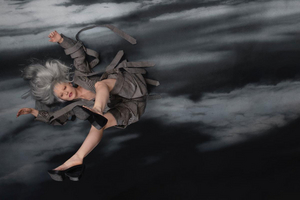KINLAW Shares New Song & Video for 'Haircut'
Their debut LP 'The Tipping Scale' is out Feb. 19th.

New York-based musician, composer, choreographer, visual artist and educator Kinlaw (she/they), has released their third single "Haircut" alongside of a captivating music video. The single is lifted from Kinlaw's forthcoming avant-goth-pop debut The Tipping Scale, out February 19th on Bayonet Records. The track touches on that temporary and familiar release: a dramatic haircut in the midst of chaos and the stillness that follows. On its surface, "Haircut" is a gentle swell of ethereal instruments-a reverberation of bells, synths, and a chorus of voices. Cutting across the abyss like a pebble into a pool of still water, Kinlaw's vocals are resigned. Untethered by percussion, the melody moves along conversationally, an inner monologue that breaks only to occasionally hit over and over on the fact that sometimes we can't stop the walls from falling. Listen to and watch "Haircut" now HERE.
"I cut my hair to confuse myself," Kinlaw explains of the song. "It started as a mission to change who I was, to make a new and better version, but ended with my feeling like I no longer knew what I was mourning. 'Haircut' is a question of personal power, and even speaking on this song today has been challenging because it was written when I was unsure if I had any power left. I think "Haircut" can be a lot of things to many different people, particularly those who identify with the juxtaposition of in-depth, internal dialogue paired with everyday coping strategies. There is a sweetness to it, but also such substantial, unwavering difficulty. Today, I prefer to think of 'Haircut' as an anthem of resilience and an ode to the ways we keep going, we shapeshift, and we reinstall that there is a way to find what it is we are hoping to find."
Kinlaw is known for their solo works and multimedia productions, which feature as many as 200+ renowned dancers and performers in the NYC area, with contributions form artists like Devonte Hynes, Caroline Polacheck, SOPHIE, Dan Deacon, and more. On The Tipping Scale, Kinlaw steps out to showcase their work in a new light. A beautifully crafted record full of ornate flourishes, dancefloor ruminations, and airtight production that overlaps with a refined, artistic compositional sensibility, The Tipping Scale is an electronic, dark-pop masterpiece to move your body to.
Kinlaw is a composer, choreographer, and artist focusing on empathic potential and agency developed by performance through audio, dance, and sculptural installation. Throughout these mediums, she studies themes of power, memory, trauma, and connection. Her performances have been featured in institutions like MoMA and MoMA PS1 (video), Pioneer Works, Mana Contemporary, National Sawdust, and Knockdown Center. Kinlaw is releasing her first solo record in 2021 with Bayonet Records.
The Tipping Scale is a gorgeously sung cycle of songs that mix deeply personal lyrics with universal themes; Kinlaw is a smart, conceptual writer, one not afraid to explore deep emotions like loss, regret, and confusion, alongside strength, identity, and change. She explains that The Tipping Scale is an ideal metaphor for the record, the idea of an ever-present slipping in and out of change, and an acceptance of this kind of change. On it, she unravels intimate memories and tries to learn from them. As you listen to her songs and decode her words, you realize she's not just building songs, she's also creating a home-where painful thoughts of the past can exist within the present-as well as an entirely new, unflinching universe.
This universe she created is not metaphorical-it's, in fact, very real. Kinlaw, who often works with gesture and movement as a writing tool, found The Tipping Scale unifying her multidisciplinary practice. She found it by building a real world. As she wrote, with the goal of finding human entry points for storytelling that felt authentic and honest to her practice, she often saw the music relating to motion. "I would start with a gesture and let it build into something until a memory attached itself to it," She explains. "The memory would become a story and the story would reveal itself as something important that needed to be expressed in this album." This works, too, for the lyrical process, where harder and less smooth gestures would represent consonants, and smooth, flowing movements would become vowels. She found the same thing happening with melodic lines and key changes. This is a record that jolts between the corporeal and the psychological, drawn from a flailing body, anchored by inconvenient truths.
Listen to 'Haircut' here:
Photo Credit: Cameron Tidball
Videos

